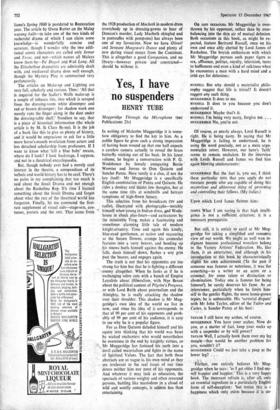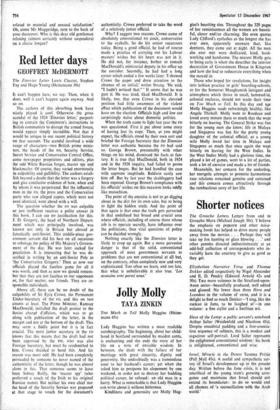Yes, I have no suspenders
HENRY TUBE
In writing of Malcolm Muggeridge it is some- how obligatory to find the key to him. As a public figure he gives such a strong impression of having been wound up that one half expects a.. careless camera actually to -reveal the brass butterfly sticking out of his back. In his latest volume, he •begins a conversation with P. G. Wodehouse by . loosely. comparing _ Bertie Wooster and Jeeves to. Don Quiikote and Sancho Panza. Here surely is a clue, if not the key itself: Mr >Muggeridge -is a specifically. English combination of Pima and Quixote. He rides a-donkey'and thinks low thoughts,.but at the same time -tilts it windmills and betrays sympioms of high-flown lunacy. . This selection from his broadcasts (TV and radio), illustrated with photograPhs—notably himself when•young in Indian dress, do Wode= honse in check plus-fours7and caricatures by the inimitable Trog, makes a faicinating and sometimes alarthing little tale of modern knight-eirantry: Time and .again this kindly; bhie-eyed gentleman,s as native and reassuring as ' the Sussex Downs, cramps his avuncular features -into a rusty beaver, and bending ,up his sinews hurls himself against the-eneiny.'lle falls, dusti -himself 'down, flashes a wry grin past the beaver, and engages again. The truth is not that his oPponents are too strong for him but that he is fighting a different enemy altogether. When he looks as if he is exchanging sabre Outs with a bunch of Empire Loyalists about illiberalism, with Nye Bevan about the political content of Pilgrim's Progress, or with Lord Reith about. paternalism and the Almighty, he is really attacking the shadow over their shoulder. This shadow is Mr Mug- geridge's own idea of the world we live in now, and since his idea of it corresponds to that of 90 per cent of his opponents and prob- ably of 99 per cent of his audience, it is easy to see-why he is a popular figure. • For as Don Quixote deluded himself and his squire into thinking that his world was beset by wicked enchanters who would nevertheless be overcome in the end by knightly virtues, so Mr Muggeridge has fastened -his teeth into a devil called materialism and fights in the name of Spiritual Values. The fact that both these abstracts are as vague in his own- mind as they are irrelevant to the real issues of our time deters neither him nor most of his opponents. And whatever it may lack as education, the spectacle of various weighty and often reverend persons, battling like mastodons in a cloud of wild and woolly concepts, is seldom less than entertaining. On rare occasions Mr Muggeridge is over- thrown by his opponent, rather than by over- balancing into the thin air of mutual delusion. Both occasions in this book, .as might be ex- pected, feature Bertrand Russell, once on his own and once ably abetted by Lord James of Rusholme. The boyish enthusiasm with which Mr Muggeridge pursues such paper tigers as sex, affluence, politics, royalty, television, turns to bafflement and even a kind of sulkiness when he encounters a man with a hard mind and a cold eye for delusions: RUSSELL But why should a materialist philo- sophy suggest that life is trivial? It doesn't suggest any such thing.
MUGGERIDGE It does to me.
RUSSELL It does to you because you don't understand it.
MUGGERIDGE Maybe that's it. RUSSELL I'm being very nasty, forgive me. . MUGGERIDGE No, you're not.
Of course, as nearly always, Lord Russell is right. He is being nasty. In saying that Mr Muggeridge is failing to understand, he is using the word precisely, not as a mere argu- mentative retort. However, our hero's 'faith' seems to remain unshaken. In the interview _with Lords Russell and James .we find him again blowing smokescreens:
MUGGERIDGE But the fact is, you see, I think these particular tests that you apply do not measure people who are capable of doing This mysterious and abhorrent thing of governing and controllihg their fellows. (My italics.)
Upon which Lord James flattens him:
JAMES What I am, saying is that high intelli- gence is not a sufficient criterion; it is a necessary prerequisite.
But still, it is unfair, to cavil at Mr Mug- geridge for taking a simplified and romantic view of our world. We might as well wax in- dignant because professional wrestlers belong to the Variety Artistes' Federation. He, like them, is an entertainer, and although in his introduction to this book he characteristically slight's his own achievement On the past if someone was famous or notorious, it was for something—as a writer or an actor or a criminal; for some talent or distinction or abomination. Today one is famous for being famous'), he surely deserves his fame. As an interviewer, particularly when he limits him- self to the gentler flights, the more home-grown topics, he is unbeatable. His 'sartorial dispute' with Mr John Taylor, editor of the Tailor and Cutter, is Sancho Panza at his best:
TAYLOR I still have my arches, of course. mucc,ninGn You have your arches. Now do you, as a matter of fact, keep your socks up with a suspender or by will power?
TAYLOR Well, I actually hook them over my leg musplg—that would be another problem for you, wouldn't it? MUGGEIUDGE Could we just take a peep at the lower leg? . . .
Further, one entirely believes Mr Mug- geridge when he says: 'as I get older I find my- self happier and happier.' This is a very happy book. The incessant refrain is, after all, only an essential ingredient in a particularly English form of self-deception: 'but notice this is a happiness which only exists because it is un-
Telated to material and sensual satisfaction: Oh, come Mr Muggeridge, turn to the back of your dustcover. Who is this dear old gentleman relaxing (almost certainly without suspenders) on a chaise longue?



































 Previous page
Previous page